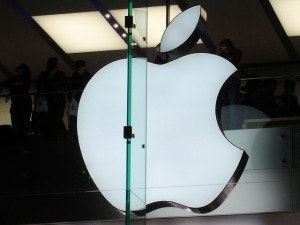
The question most ordinary investors ask is: why in the world does a company this size need to raise money at this magnitude, while having so much cash in the bank?
Tax issues
A significant part of Apple Inc. (NASDAQ:AAPL)’s cash and cash equivalent is trapped outside the U.S. – the recent numbers are: $102 billion out of $145 billion is held overseas. A 35% income tax is certainly an issue for Apple, or anybody in his right mind. If Apple were to repatriate its foreign-held cash, it would be subject to U.S. corporate income taxes. In other words, Apple would have to cut a $14 billion check to the IRS.
The U.S. marginal income tax rates are among the highest in the developed world. The problem lies in the fact that corporate income taxes aren’t uniform. Corporate America “formula” for U.S. tax duty is very simple – take deductions on foreign income taxes paid, but stay away from foreign profits that are subject to higher U.S. tax rates. The average “Joe” would probably do the same if he had the legal opportunity.
Return money to frustrated investors
Apple Inc. (NASDAQ:AAPL) shares have dropped over 40% year-to-date, and the slide in stock price led to pressure from frustrated investors. As a result, Tim Cook and the company realized Apple needs to return money to investors, and, basically, let the financial juggling begin.
The first move was the board’s announcement of the company’s intention to increase its share repurchase program from $10 to $60 billion – the largest share buyback authorization of a public company in history. The stock repurchase program came shortly after the stock traded near its 52-week lows.
To put current cash holdings into perspective, Microsoft Corporation (NASDAQ:MSFT) and Google Inc (NASDAQ:GOOG) hold $85 and $50 billion in cash, respectively. Microsoft Corporation (NASDAQ:MSFT)’s repurchase program started in 2004 and already reached the imaginary $101 billion. Furthermore, according to Bloomberg, Google Inc (NASDAQ:GOOG) shareholders are urging the web search giant to follow Apple Inc. (NASDAQ:AAPL) and return part of its $44 billion in cash to investors. One should note, however, that repurchases don’t always pay off for investors. In any case, following the stock repurchase, Apple raised its quarterly dividend by 15% to $3.05 per share.
The second move was issuing the largest bond offering in the world outside the financial sector. Apple Inc. (NASDAQ:AAPL) issued six bond trenches totaling $17 billion. The offering includes three and five-year variable rate bonds, as well as three, five, ten and 30-year fixed rate bonds. The three-year fixed interest bonds will be 0.45%, only slightly higher than three-year U.S. government bonds, which is now about 0.3%. The bonds are expected to channel more investment in Apple, and will be considered a relatively safe investment.
The third move, which was supported by David Einhorn, hedge fund manager and founder of Greenlight Capital, was the issuance of preferred shares, which carry a fixed dividend.
Apple vs Microsoft vs Google
Apple Inc. (NASDAQ:AAPL) paid higher interest rates on a record $17 billion bond sale than rival Microsoft Corporation (NASDAQ:MSFT). Apple’s debt to equity ratio is 12.5%, significantly lower than the 18.5% of Microsoft, which has $16.9 billion of bonds outstanding, and the highest Aaa credit rating from Moody’s and an equivalent AAA at Standard & Poor’s.
Moody’s and S&P ranked Apple a level lower at Aa1 and AA+, respectively. According to Fitch, the rating tier is inconsistent with Apple Inc. (NASDAQ:AAPL)’s credit risk, and stated that the company’s significant liquidity cushion was offset by the threat of volatile consumer preferences, significant competition, and rapid technology changes. Besides, Microsoft Corporation (NASDAQ:MSFT) is operating in the same “hostile” environment, but did not lose its perfect rating.
Fitch hasn’t released a public grade for Apple. It said such a ranking would be likely to fall “at the highest end” of the single-A tier, at least three levels below the AA+ grade of Microsoft. From a bondholder’s perspective, Microsoft Corporation (NASDAQ:MSFT) and Apple Inc. (NASDAQ:AAPL) are virtually equal, except that Microsoft has a larger installed base and better channels for recurring revenue.
Google Inc (NASDAQ:GOOG) typically avoided debt offerings. The company sold $3 billion worth of bonds for the first time in 2011. One can only assume that, under the current market conditions, the chances that Google Inc (NASDAQ:GOOG) will issue bonds are relatively high.
The foolish bottom line
The environment where Apple operates, including the current U.S. tax laws, encourage corporate America to keep money abroad, for obvious reasons. Companies such as Apple Inc. (NASDAQ:AAPL), Google Inc (NASDAQ:GOOG), and Microsoft Corporation (NASDAQ:MSFT) will continue to juggle in any way, shape, or legal form to avoid high U.S. marginal income taxes. Despite the fact that Apple is a technology company subject to trends and fast changing consumer preferences, Apple Inc. (NASDAQ:AAPL) should have no problem paying coupons to bondholders, rather than pay a fat check to the IRS. I truly believe that the folks in Washington should be more proactive to adjust U.S. tax laws to meet the 21st century new reality. All that said, the single most impressive fact about the whole story is that Apple Inc. (NASDAQ:AAPL) still expects its cash on hand to grow.
The article The Real Reason Why Apple Issued Debt originally appeared on Fool.com.
Copyright © 1995 – 2013 The Motley Fool, LLC. All rights reserved. The Motley Fool has a disclosure policy.




